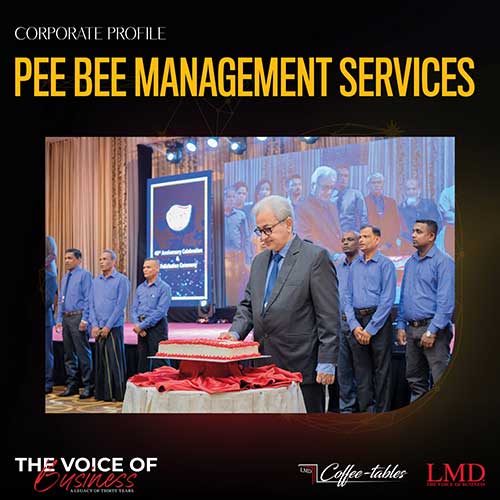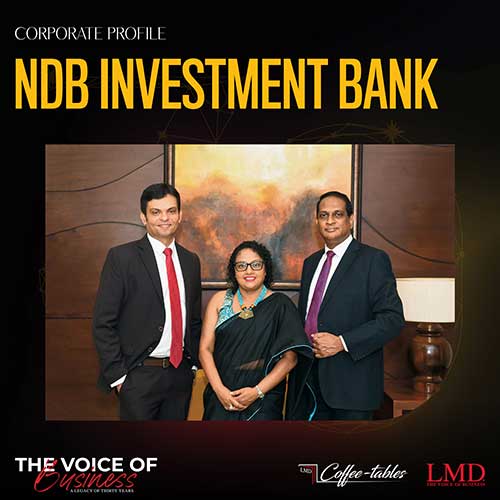REFLECTIONS
FROM THE FIRST DECADE
A selection from LMD’s Cover Stories
JANUARY 1999
SRI LANKAN OF THE YEAR 1998
Sumadhu Weerawarne profiles LMD’s Sri Lankan Of The Year – Deshamanya Ken Balendra

Deshamanya Ken Balendra, at 58, is a preeminent businessman: experienced, skilled and influential; and charming, as anyone who has met him at a social function would agree. But he can be firm and decisive, as befits the numerous high-ranking positions he holds in the business world today.
Ken Balendra started out as a tea and rubber planter with James Finlays, then joined John Keells in 1970. He was one of some 40 executives working for the company at the time. Nine years later, he moved on to Walkers Tours, the travel arm of Keells, as its managing director. In 1986, he became deputy chairman of the company.
Today, Balendra is the Chairman and Chief Executive Officer of John Keells Holdings, the holding company of the John Keells Group, the nation’s leading listed company, according to the 1997/98 LMD 50. The conglomerate’s business portfolio ranges from food and beverage, transportation, plantations, leisure and financial services, to information technology, exports, and domestic and international trade.
Despite his undoubted abilities, Balendra is modest about his achievements. “1 was lucky enough to be in the right place at the right time,” he says. Asked if he ever envisioned himself as a leading businessman, he replies: “Not really but maybe it was somewhere there…”
It is to Balendra’s credit that he was the first Sri Lankan to be appointed as the company’s Chairman – a position he has held since 1990. In 1994, John Keells became the first Sri Lankan company to obtain a quotation of its shares overseas, thus enhancing its corporate capital. But stocks and shares come later… He says: “I have always said that the strength of the company is first its people, second its people and third its people. We have a great team and this has been the main pillar of the company’s success.”
In his youth, Balendra was a fine sportsman, being a member of the rugby teams of Royal College, CR & FC and the Ceylon Barbarians. Perhaps he learnt the satisfaction of working as part of a well-knit team on and off the rugby field.
How does one explain his relaxed appearance? It is perhaps his attitude towards work. “I am not a workaholic. I am a delegator. But life is still hectic.” His day begins at 7 a.m. with the first telephone call and can go on till midnight, depending on the social occasion, at which business is never far away. “I am invited to a multiplicity of events by business associates and I am obliged to attend,” he says.
For instance, he serves as a director of Union Assurance and United Motors, and he is the non-executive chairman of the US $120 million and sponsored by the Commonwealth Development Corporation for Investment in South Asia, also known as the South Asia Regional Fund.
And this is on top of many other obligations – as a president of the Old Royalists Businessmen’s Club, and on the boards of trustees of the George Keyt and Duncan White Foundations.
Perhaps Balendra has been able to achieve so much but remain unhurried because he has enjoyed the support of his wife. “She is a doctor but gave up work when the children were small. She has been behind me 100 percent. She is very, very supportive,” he confides.
As for leisure – when there is time for this, mainly on the weekends – he reads. “I do not have a particular author I like. I read any book I feel is good.” But the books he has recently read, such as the autobiographies of President Nelson Mandela and former Singaporean Prime Minister Lee Kuan Yew, indicate a certain predisposition – at this time, at least – to issues of leadership and governance.
There is diversity and versatility about him, which may have contributed to his willingness to do what is new and uncharted. He has defied the belief that those who have had an English language or foreign education are more suited to join the ranks of elite businesses.
Believing that a student who enters a Sri Lankan university after such intense competition and passes out with a first or second-class degree must have immense potential, he advertised in the Sinhala press for graduates. These young people have become proficient in English and fitted into the corporate culture of John Keells, he notes.
Balendra has broad views on the role of the private sector. No doubt, this positive attitude was what led President Chandrika Bandaranaike Kumaratunga to award him the national honour of Deshamanya in 1998 – an honour that is limited to 65 living persons. He subscribes to the view that the corporate sector should be socially responsible, that it should give back to those from whom it takes.
He says: “The private sector has been termed the engine of growth. But unless the larger community accepts the private sector as being socially responsible, it is not possible for the open market economy to thrive.”
The venture into the peace process is undoubtedly the corporate sector’s most ambitious project. The aim of the business leaders is primarily to achieve a bipartisan consensus between the government and main opposition party on the principles that would determine a solution to the ethnic conflict.
Balendra has definite words of advice to those closer to home. “Young business leaders must be technology driven and have guts.” He epitomises these qualities himself. He is a very concrete man. both in appearance and in words.
There is no vagueness in him. Every phrase has a punch in it – a favourite one: “When the going gets tough, the tough get going.” It is important to Sri Lanka that they do.
LMD’s 1998 Sri Lankan Of The Year is a man with a vision, a characteristic that indeed drove him up the corporate ladder of Sri Lanka’s most distinguished and successful conglomerates nine years ago. Yet, it’s more than a vision that makes him remain and grow at the top, a distinct feature that many others do not possess. Essentially, he is a team man, a leader who believes in teamwork.

AT THE HELM Today, Deshamanya Ken Balendra helms John Keells Holdings (JKH), Sri Lanka’s number one company in terms of market capitalisation of the Colombo Stock Exchange (CSE). JKH, together with its subsidiaries and associate companies, accounts for more than 12 percent of the market capitalisation of the CSE. JKH also emerged as Sri Lanka’s leading listed company in The LMD 50 for 1997/98.
The group has 60 subsidiaries, and individually, they are market leaders in almost all fields of business they are engaged in. Indeed, JKH is a truly diversified conglomerate that has succeeded not only locally but also internationally.
Becoming the first Sri Lankan to head a conglomerate that has its roots way back into the 1870s is by no means a coincidence. It required hard work, perseverance, commitment and an unquenchable thirst for excellence – driven by sheer entrepreneurial zeal to overcome many a challenge over the years.
For many in the business community, Balendra’s feats are well known. Yet, on this occasion of being nominated as LMD’s ‘Sri Lankan Of The Year,’ some of his recent achievements warrant re-emphasis.
LEADERSHIP SKILLS He was picked to be the non-executive chairman of a fund sponsored by the Commonwealth Development Corporation (CDC) for investment in South Asia. To be invited to head the South Asia Regional Fund (SARF) aptly proves that Balendra’s credentials and leadership skills are recognised both internationally and regionally.
He is also the Chairman of the Ceylon Chamber of Commerce, a past chairman of the Colombo Brokers Association, a trustee of the Duncan White Sports Foundation and Deputy Chairman of the George Keyt Art Foundation. He also heads the first private sector thermal power producing company and has also been actively associated with a host of overseas business promotion missions on behalf of the nation.
FOCUS ON YOUTH Though he shuns personal credit, it was his decision to enlist a young team of board members, comprising both men and women who share his vision and zeal, to steer the group to the pinnacle of corporate success.
TEAM BUILDING The results of teamwork at JKH are astonishing. For instance, group turnover, which was Rs. 762 million in 1990, has soared to Rs. 8.7 billion in eight years while after tax profit crossed the Rs. 1 billion mark in 1997/98 (JKH is the first to achieve this feat) from Rs. 75 million in 1990.

GLOBAL RECOGNITION In 1994, JKH became the first Sri Lankan company to obtain a quotation of its shares overseas, thus embarking on a groundbreaking exercise in corporate capital enhancement. The Global Depository Receipt (GDR) issue, worth US $35 million, was substantially oversubscribed, reflecting the appeal JKH created among foreign investors.
According to Balendra, the successful GDR issue had been largely instrumental in driving the group to its current levels of excellence. “It gave us the financial strength to go| ahead and execute plans that have steered the company for the past four years,” he points out.
The sound financial strength also encouraged JKH to become the major local shareholder in the firm floated to develop the Queen Elizabeth Quay (QEQ), which once completed, will become Sri Lanka’s largest ever private sector investment.
And less than 10 days ago, Fortune magazine ranked JKH amongst the top 10 shares in Asia, describing the conglomerate as “superbly managed.”
INITIATING PEACE He was one of the prime movers of the business leaders’ peace initiative, which has raised new hope for a lasting solution to the ethnic conflict. In JKH’s recent annual reports, the need for an early settlement has been repeatedly stressed.
For instance, his comments in the 1997/98 review could not have reinforced the need in a more forceful way.
He says: “We can dwell at length on macroeconomic issues but all this pales into insignificance when one considers the overall impact of the continuing northeast conflict. Tens of thousands of lives have already been lost. The social and economic fabric of the nation has already been torn to such an extent that it could soon become irreparable. Our sincere hope is that all Sri Lankans will work towards ending this conflict as a matter of utmost urgency.”
If, as he says, the private sector or the business sector had taken a back seat in the country’s political and national affairs to date, it was time that they stood up and be heard.
“We in the chambers collectively felt that the private sector must step in and request all political parties to initiate a bipartisan approach to solve pressing national issues,” he says. “We don’t know how peace can be achieved nor the modalities required. But we are convinced that a bipartisan attitude is a must to find a lasting and an early solution,” he adds.
Despite the ongoing crossfire between the major political parties, Balendra is confident that the business leaders’ initiative will succeed in acting as a conduit for a bipartisan approach. “We need to have it in the best interests of the nation and our future generations,” he emphasises.
He strongly believes that if the conflict is solved, Sri Lanka will sprint towards newly industrialised country status. “The conflict is the only negative factor while the rest are very positive. The war is a psychological barrier for greater growth. Once the war is behind us, nothing can stop us,” he says confidently.
He also reveals that peace was picked as a priority issue following a request made at the all-party conference and that other national issues listed by the business leaders should also be addressed in a bipartisan manner. “We are busy preparing position papers on those other subjects,” he explains.
FUTURE BUSINESS LEADERS Deshamanya Ken Balendra believes that future business leaders have the scope to play their role in developing the nation further: “I can see in the new millennium, business leaders being very proactive with regard to matters of national interest and welfare of the country. I also feel that in the future, business leaders will be strong and apolitical… And they will not hesitate to call a spade a spade when it comes to politicians, and say that they are acting in a manner that is detrimental to the economic interests and development of the nation.”
“They will realise that their strength stems from the fact that they are responsible for a substantial part of the country’s GDP, and they will ensure that their views and opinions are taken seriously,” he explains.
He is of the view that the business community should be more socially responsible, and work alongside NGOs and other social groups.
INFORMATION REVOLUTION On the other hand, he says the information revolution and the electronic media will make people realise that businesses are not merely interested in making money, and that it is in society’s interest to ensure continuity of businesses: “An increasingly socially responsible private sector would make society and the local populace concerned to realise that they are indeed stakeholders of a business, even though they are not directly involved.”
Commenting on where success lies for businesses in the new millennium, he said that adopting new technology would be key, both to improve productivity and to remain competitive.
In this context, he strongly advocates that the education system be improved to produce youth who are capable of leading businesses that are largely driven by technology in the new millennium. The workforce must also be trained to work with new technology.

BUSINESS EXPANSION He also foresees businesses expanding into the provinces as part of their overall proactive attitude and being socially responsible. He says that future growth would be in the broader services sector and the technology sector.
Agriculture, he says, would continue to be the backbone of the economy though Sri Lanka has neglected it in its race towards rapid industrialisation. “Value addition in agriculture has a tremendous future and this will boost the manufacturing sector as well,” he observes.
ROLE OF GOVERNMENT LMD asked Balendra about the role government should play in the new millennium. He says that the state should continue to play a facilitator’s role in providing and developing the basic social infrastructure, improving transparency, and encouraging more investment and employment generation. “Politics should play second fiddle with priority given to economic growth for the nation’s prosperity,” he suggests.
Finally, he says that in the future, politicians would be voted into office by the people not purely on the extent of “freebies” but on strong economic performance and prosperity: “Creation of wealth will be the key focus but I strongly believe it must be done without, in any way, dropping social, cultural and religious values. For this, the country needs the effective contribution from all concerned: politicians, the private sector, trade unions, religious leaders, professionals and civil society,” he concludes.





